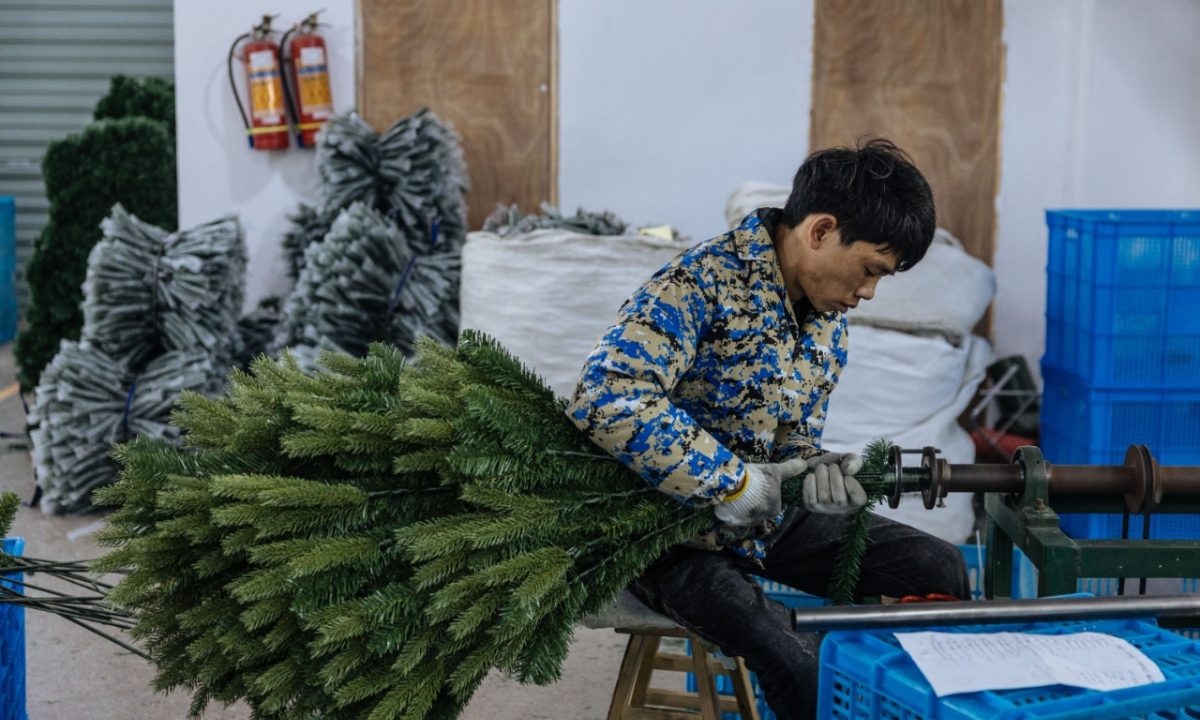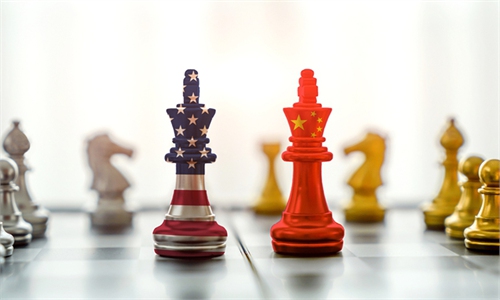Americans still haunted by inflation
Experts call for removal of US tariffs, other restrictive trade barriers

A worker manufactures Christmas trees in Yiwu, East China's Zhejiang Province on December 5, 2023. Photo: Li Hao/GT
There has been a discussion about how the economic policies of the Biden administration have hit Christmas trees, with the average price rising 10 percent from last year and making the upcoming holidays more expensive.
Per a survey conducted by the American Christmas Tree Association, 78 percent of the consumers interviewed say they are still concerned about inflation, according to a report by Newsweek.
Besides Christmas trees, the prices of gold and a wide array of Christmas items on Amazon have all shot up in recent weeks.
Everything from Christmas trees to decorations have gone up in prices, a Chinese national who works in Arkansas told the Global Times.
"In fact, it is not just Christmas goods, almost everything that we buy have seen a price rise of 1.5 times or more from pre-pandemic levels," the person said. "Our salaries, which are adjusted on an annual basis, are in no way to catch the inflated prices of goods and services."
"Our orders from the US and the EU have plummeted by at least a half, and many of my colleagues in the industry are reporting the same situation… it seems that Americans' spending power is being stretched," Sun Xudan, a Christmas tree producer in Yiwu in East China's Zhejiang Province, told the Global Times on Thursday.
"Many merchants would come to me and say: show me some cheap models, nowadays American customers don't want expensive and fancy stuff, so I decided to bring some low-cost products to them," Sun said.
Chinese analysts said the phenomenon underlined the US is still facing inflation woes, while the global media is speculating when the US Federal Reserve will start to cut interest rates.
Quantitative easing
After three years of quantitative easing by the Fed, inflation in the US is hard to contain, even though the latest reading revealed that US CPI receded to 3.2 percent in the 12 months through October, said the US Bureau of Labor Statistics.
Liu Ying, a research fellow from the Chongyang Institute for Financial Studies at Renmin University of China, told the Global Times on Monday that the latest inflation reading, though dropped compared to the previous months, is still far from US policymakers' target of 2 percent.
The reading also belies the feeling among US consumers on the ground, as it was based on soaring increases in 2022, Liu said. "It is a vicious circle of inflation, as people demand higher wages, which drives higher inflation."
Zhou Mi, a senior research fellow at the Chinese Academy of International Trade and Economic Cooperation, told the Global Times on Monday that the US' elevated inflation is omnipresent and Christmas season won't be an exception.
Although wage rises have helped to buffer against inflation to some degree, wage rises are not sustainable, Zhou said, noting that low-income groups in the US bear the brunt of high inflation.
Liu noted that record high interest rates also weigh on American households, which rely heavily on credit card spending and are burdened with high rates.
Since March 2022, the Fed has hiked its policy rate by 525 basis points to the current 5.25-5.50 percent range, marking one of the most aggressive rate paths in nearly 40 years.
Many economists are cautious about the US economy's outlook in 2024, with some saying that a recession remains possible.
The cooling of the US economy will also drag down the global economic recovery and pose serious challenges for the developing countries and emerging economies, experts said.
Uneven recovery
Analysts said that as the world continues to face an uneven economic recovery, the US should engage with China in earnest cooperation in order to tame the inflation. The US removing its tariff barrier on goods imported from China may be a way out, they said.
Liu, having recently returned from a field trip to Yiwu city, the world's capital for small commodities in Zhejiang Province, East China, said removing tariffs on Chinese goods will produce an immediate effect on lowering consumer prices in the US. Yiwu produces about 60 percent of global Christmas decorations.
"Many of the Christmas tree makers complain that their exports are subject to high tariffs in the US market," Liu said.
Chinese experts urged the US to scrap tariffs it placed on Chinese goods since the Trump era and that have been largely unchanged since Biden assumed office in 2021.
Liu said the deeply intertwined trans-Pacific supply chain is impossible to decouple, no matter how hard US officials try. "The Biden administration should realize this and roll out policies that are conducive to the smooth and sound development of supply chains."
American consumers could lose $31 billion in spending power if US tariffs are raised on common household products like microwaves or T-shirts imported from China, according to a new report released by the US National Retail Federation on October 12.
Regardless of the external challenges imposed, many US multinationals have actively explored partnerships at the recently concluded 6th China International Import Expo in Shanghai and China International Supply Chain Expo in Beijing, in a reflection of their willingness to build a stronger foothold in China.



